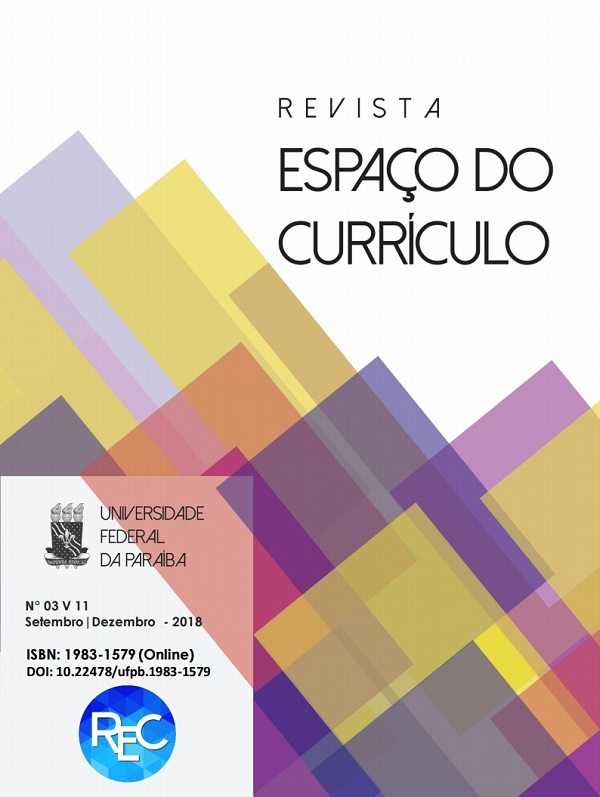ENVIRONMENTAL EDUCATION IN INTEGRATIVE AND RESTAURATIVE VIEWS
educational curricula in the Amazon
DOI:
https://doi.org/10.22478/ufpb.1983-1579.2018v3n11.41937Keywords:
Environmental Education, The Brazilian Amazon, School CurriculaAbstract
Environmental Education policies are tailored to different contexts, many of which are a far cry from reality in the Amazon. However, it is in the school, through disputes and negotiations, that curriculum standards approximate to social actors and therefore “materialize” in everyday life. In this sense, the school is constituted as social space-time in which environmental knowledge and environmental practices are confronted daily. It is within this space-time that teachers are challenged to engage in dialogue with reality and adopt integrative and restorative approaches to contextualize the history, culture and life of the Amazon. Thus, the challenge of integrating the curriculum to the social experience of the community, and therefore destabilize curriculum standardization, remains. Thinking about this social experience implies (re)gaining an understanding of educational practices that resignify environmental education in the curriculums of schools in the Brazilian Amazon, in this case the municipal education network in Castanhal, in the State of Pará. We adopted a methodological framework based on Social Representation Theory and the principles and methods of ethnography. A questionnaire was conducted with 121 teachers and complemented by two group discussions and participant observation. The findings show that the approach to environmental education draws mainly on naturalistic conceptions of the environment and the existence of a social movement among teachers that questions these conceptions, calling for other ways of thinking the curriculum and the environmental challenges faced by the region.
Downloads
Metrics
References
ANDRADE, Francisca Marli R. Educação Ambiental na Amazônia: um estudo sobre as representações sociais dos pedagogos, nas escolas da rede pública municipal de Castanhal- Pará (Brasil). Tese de doutorado. Universidade de Santiago de Compostela (USC), 2014a.
_____. Educación Ambiental na Amazonía: das representacións sociais ás prácticas pedaxógicas cotiás. Revista Ambientalmente Sustentable, La Coruña, v. 2, n. 18, p. 49-64, 2014b.
_________. Natureza Amazônica e Educação Ambiental: identidades, saberes docentes e representações sociais. Revista Científica RUNAE, Javier Loyola, v. 01, p. 51-70, 2017.
ANDRADE, Francisca Marli. R.; CARIDE, José Antonio. Educação Ambiental na Amazônia brasileira: participação e reclamos sociais em tempos pós-hegemônicos. Revista Espacios Transnacionales, Ciudad de México, v. 4, n. 7, p. 34-48, 2016.
_________. Educação Ambiental e formação docente na Amazônia brasileira: contextos universitários e realidades cotidianas. Revista Diálogo Educacional, Curitiba, v. 17, n. 55, p. 1598-1618, dez., 2017.
ARAÚJO, Sônia Maria Silva. A construção do sujeito e a diversidade (ameaçada) da Amazônia. Revista Múltiplas Leituras, São Paulo, v. 2, n. 1, p. 39-49, 2009.
BOONEN, Petronella Maria; MARQUES, Mariana Pasqual. Por uma justiça que instaura direitos – O desenvolvimento da Justiça Restaurativa no Brasil. In: MERLINO, Tatiana; MENDONÇA, Maria Luisa (Org.). Direitos Humanos no Brasil 2011: Relatório da Rede Social de Justiça e Direitos Humanos. São Paulo: Rede Social de Justiça e Direitos Humanos, 2011, p. 149-153.
FOUCAULT, Michel. Hay que defender la sociedad. Madrid: Ediciones Akal, 2003.
FRAXE, T. P.; WITKOSKI, A. C.; MIGUEZ, S. F. O ser da Amazônia: identidade e invisibilidade. Ciência e Cultura, São Paulo, v. 61, n. 3, p. 30-32, 2009.
GODOY, Ana; AVELINO, Nildo. Educação, meio ambiente e cultura: alquimias do conhecimento na sociedade de controle. Educação em Revista, Belo Horizonte, v. 25, n. 3, p. 327-351, 2009.
GUARESCHI, Pedrinho A. Representações sociais e ideologia. Revista de Ciências Humanas, Florianópolis, [Edição Especial Temática], p. 33-46, 2000.
JODELET, Denise. La representación social: fenómenos, conceptos y teoría. In: MOSCOVICI, S. (org.). Psicología Social, II. Pensamiento y vida social. Psicología social y problemas sociales. Barcelona: Paidós, 1985, p. 469-494.
LOUREIRO, Violeta Refkalefsky. Amazônia: uma história de perdas e danos, um futuro a (re)construir. Estudos Avançados, São Paulo, v. 16, n. 45, p. 107-121, 2002.
MOSCOVICI, Serge. El psicoanálisis su imagen y su público. Buenos Aires: Huemul, 1979.
_____. Representações sociais: investigações em psicologia social. 7a ed. Petrópolis, RJ: Vozes, 2010.
PELICIONI, Andrea Focesi; Ribeiro, Helena. Capacitação, representação social e prática em Educação Ambiental. Revista Brasileira de Ciências Ambientais, Rio de Janeiro, n. 2, p. 21-24, 2005.
PORTO-GONÇALVES, Carlos Walter. Amazônia: encruzilhada civilizatória: tensões territoriais em curso. Rio de Janeiro: Consequência Editora, 2017.
REIGOTA, Marcos. O que é educação ambiental? (2a. ed.). São Paulo: Brasiliense, 2009.
_____. A floresta e a escolar: por uma educação ambiental pós-moderna. 4. ed. São Paulo: Cortez, 2011.
SILVA, Tomaz Tadeu. Escuela, conocimientos y curriculum: ensayos críticos. Buenos Aires: Miño y Dávila editores S.R.L., 1995.
_____. Espacios de identidad: nuevas versiones sobre el currículum. Barcelona: Octaedro, 2001.
SPINK, Peter Kevin; ALVES, Mário Aquino. O campo turbulento da produção acadêmica e a importância da rebeldia competente. O&S, Salvador, v. 18, n. 57, p. 337- 343, 2011.
TERRÓN, Esperanza. Horizontes de la educación ambiental. Un estudio de representaciones sociales. In: CALIXTO-FLORES, Raúl. (Org.). En la búsqueda de los sentidos y significados de la educación ambiental: aportaciones iberoamericanas. México: UPN, 2012, pp. 129-148.
TRISTÃO, Marta. Saberes e fazeres da educação ambiental no cotidiano escolar. Revista Brasileira de Educação Ambiental, São Paulo, [Novembro], p. 47- 55, 2004.
TUKANO, Álvaro. O mundo Tukano antes dos brancos: um mestre Tukano. V. I. Brasília: AYÓ – Instituto de Ciências e Saberes para o Etnodesenvolvimento, 2017.
VIVEIROS DE CASTRO, Eduardo. Metafísicas canibais: elementos para uma Antropologia pós-estrutural. São Paulo: Ubu Editora, n –I edições, 2018.
XAVIER, Roseane. Representações sociais e ideologia: conceitos intercambiáveis?. Psicologia & Educação, Belo Horizonte, v. 14, n. 2, p. 18-47, 2002.
Downloads
Published
How to Cite
Issue
Section
License
By submitting an article to Curriculum Space Journal (CSJ) and having it approved, the authors agree to assign, without remuneration, the following rights to Curriculum Space Journal: first publication rights and permission for CSJ to redistribute this article. article and its metadata to the indexing and reference services that its editors deem appropriate.
















